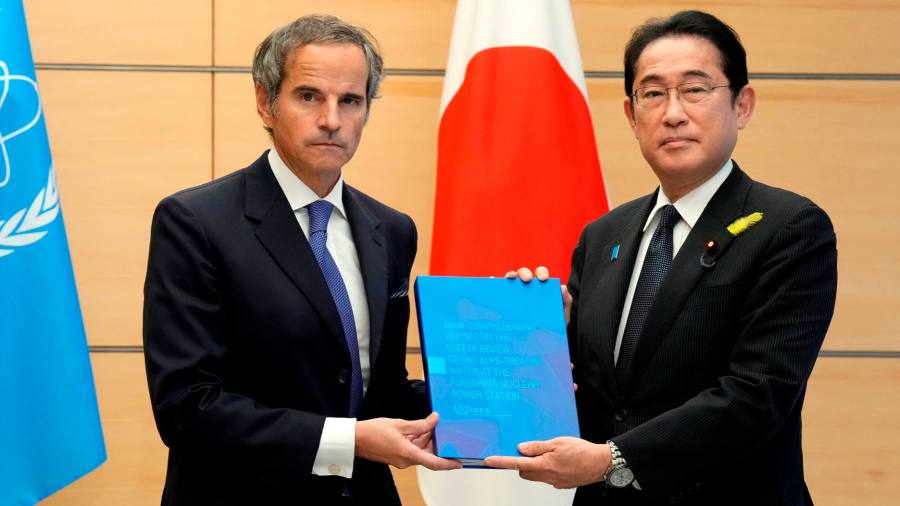
Receive free Fukushima nuclear accident updates
We’ll send you a myFT Daily Digest email rounding up the latest Fukushima nuclear accident news every morning.
The UN’s nuclear watchdog has approved Japan’s plan to release treated radioactive water from the Fukushima Daiichi nuclear plant into the Pacific, a proposal sharply condemned by China and South Korea.
A two-year review by the International Atomic Energy Agency has found that the plans were consistent with international safety standards. Gradual discharges of the treated water, which are expected to take decades to complete, would have “a negligible radiological impact on people and the environment”, the agency concluded.
“We compared with other options and we were able to confirm that this is the one that exists that has a proven track record,” IAEA head Rafael Grossi said at a news conference in Tokyo on Tuesday.
He noted that the method has been used by operating nuclear plants around the world, including facilities in China and South Korea.
The Japanese government has indicated that it would start to discharge more than 1mn tonnes of the so-called ALPS-treated water from around the summer but has not set a firm date as it awaited the IAEA’s assessment.
“I will not approve of a release that will have a harmful impact on people’s health and environment in Japan or around the world,” Prime Minister Fumio Kishida said as he received the IAEA’s report. “I will explain with care both at home and abroad with a high degree of transparency.”
The Fukushima reactors melted down in March 2011 after a devastating tsunami knocked out their cooling systems. Water subsequently used to cool the reactors, along with groundwater flowing into the site, became contaminated with radioactive nuclides.
The contaminated water has been treated with an elaborate filtration system to remove most radioactive material. However, there is no practical way to filter out tritium, a radioactive isotope of hydrogen.
Tritium has a half-life — the time needed for half of the initial radioactive substance to decay — of 12.3 years. Radiation can be dangerous to health but Japan maintains that the dose from the Fukushima water would be less than 1/40 of safety standards, or one-seventh of the World Health Organization’s drinking water standard.
Still, the plan to release the water into the sea has sparked opposition from neighbouring countries as well as from local fishermen concerned about reputational damage.
Ahead of the IAEA’s assessment, China’s ambassador to Japan said the report could not be a “pass” for the water release, while state media condemned the planned discharge as “a crime against all of humanity”.
South Korea’s agriculture minister, Chung Hwang-keun, said a ban on agricultural products from around the Fukushima plant would remain in place until public concerns in the country were alleviated.
According to a Gallup poll conducted last week, 78 per cent of South Koreans harboured concerns about possible contamination of ocean water and seafood as a result of the release. Last month Seoul’s metropolitan office of education announced it would step up radiation tests on school meals in response to anxieties expressed by students and parents.
Additional reporting by Greg McMillan in Hong Kong